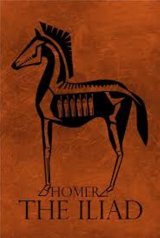Iliad Page #12
The Iliad is an ancient Greek epic poem in dactylic hexameter, traditionally attributed to Homer. Set during the Trojan War, the ten-year siege of the city of Troy (Ilium) by a coalition of Greek states, it tells of the battles and events during the weeks of a quarrel between King Agamemnon and the warrior Achilles.
Crete's hundred cities pour forth all her sons. These march'd, Idomeneus, beneath thy care, And Merion, dreadful as the god of war. Tlepolemus, the sun of Hercules, Led nine swift vessels through the foamy seas, From Rhodes, with everlasting sunshine bright, Jalyssus, Lindus, and Camirus white. His captive mother fierce Alcides bore From Ephyr's walls and Selle's winding shore, Where mighty towns in ruins spread the plain, And saw their blooming warriors early slain. The hero, when to manly years he grew, Alcides' uncle, old Licymnius, slew; For this, constrain'd to quit his native place, And shun the vengeance of the Herculean race, A fleet he built, and with a numerous train Of willing exiles wander'd o'er the main; Where, many seas and many sufferings past, On happy Rhodes the chief arrived at last: There in three tribes divides his native band, And rules them peaceful in a foreign land; Increased and prosper'd in their new abodes By mighty Jove, the sire of men and gods; With joy they saw the growing empire rise, And showers of wealth descending from the skies. Three ships with Nireus sought the Trojan shore, Nireus, whom Aglae to Charopus bore, Nireus, in faultless shape and blooming grace, The loveliest youth of all the Grecian race;(104) Pelides only match'd his early charms; But few his troops, and small his strength in arms. Next thirty galleys cleave the liquid plain, Of those Calydnae's sea-girt isles contain; With them the youth of Nisyrus repair, Casus the strong, and Crapathus the fair; Cos, where Eurypylus possess'd the sway, Till great Alcides made the realms obey: These Antiphus and bold Phidippus bring, Sprung from the god by Thessalus the king. Now, Muse, recount Pelasgic Argos' powers, From Alos, Alope, and Trechin's towers: From Phthia's spacious vales; and Hella, bless'd With female beauty far beyond the rest. Full fifty ships beneath Achilles' care, The Achaians, Myrmidons, Hellenians bear; Thessalians all, though various in their name; The same their nation, and their chief the same. But now inglorious, stretch'd along the shore, They hear the brazen voice of war no more; No more the foe they face in dire array: Close in his fleet the angry leader lay; Since fair Briseis from his arms was torn, The noblest spoil from sack'd Lyrnessus borne, Then, when the chief the Theban walls o'erthrew, And the bold sons of great Evenus slew. There mourn'd Achilles, plunged in depth of care, But soon to rise in slaughter, blood, and war. To these the youth of Phylace succeed, Itona, famous for her fleecy breed, And grassy Pteleon deck'd with cheerful greens, The bowers of Ceres, and the sylvan scenes. Sweet Pyrrhasus, with blooming flowerets crown'd, And Antron's watery dens, and cavern'd ground. These own'd, as chief, Protesilas the brave, Who now lay silent in the gloomy grave: The first who boldly touch'd the Trojan shore, And dyed a Phrygian lance with Grecian gore; There lies, far distant from his native plain; Unfinish'd his proud palaces remain, And his sad consort beats her breast in vain. His troops in forty ships Podarces led, Iphiclus' son, and brother to the dead; Nor he unworthy to command the host; Yet still they mourn'd their ancient leader lost. The men who Glaphyra's fair soil partake, Where hills incircle Boebe's lowly lake, Where Phaere hears the neighbouring waters fall, Or proud Iolcus lifts her airy wall, In ten black ships embark'd for Ilion's shore, With bold Eumelus, whom Alceste bore: All Pelias' race Alceste far outshined, The grace and glory of the beauteous kind, The troops Methone or Thaumacia yields, Olizon's rocks, or Meliboea's fields, With Philoctetes sail'd whose matchless art From the tough bow directs the feather'd dart. Seven were his ships; each vessel fifty row, Skill'd in his science of the dart and bow. But he lay raging on the Lemnian ground, A poisonous hydra gave the burning wound; There groan'd the chief in agonizing pain, Whom Greece at length shall wish, nor wish in vain. His forces Medon led from Lemnos' shore, Oileus' son, whom beauteous Rhena bore. The OEchalian race, in those high towers contain'd Where once Eurytus in proud triumph reign'd, Or where her humbler turrets Tricca rears, Or where Ithome, rough with rocks, appears, In thirty sail the sparkling waves divide, Which Podalirius and Machaon guide. To these his skill their parent-god imparts, Divine professors of the healing arts. The bold Ormenian and Asterian bands In forty barks Eurypylus commands. Where Titan hides his hoary head in snow, And where Hyperia's silver fountains flow. Thy troops, Argissa, Polypoetes leads, And Eleon, shelter'd by Olympus' shades, Gyrtone's warriors; and where Orthe lies, And Oloosson's chalky cliffs arise. Sprung from Pirithous of immortal race, The fruit of fair Hippodame's embrace, (That day, when hurl'd from Pelion's cloudy head, To distant dens the shaggy Centaurs fled) With Polypoetes join'd in equal sway Leonteus leads, and forty ships obey. In twenty sail the bold Perrhaebians came From Cyphus, Guneus was their leader's name. With these the Enians join'd, and those who freeze Where cold Dodona lifts her holy trees; Or where the pleasing Titaresius glides, And into Peneus rolls his easy tides; Yet o'er the silvery surface pure they flow, The sacred stream unmix'd with streams below, Sacred and awful! from the dark abodes Styx pours them forth, the dreadful oath of gods! Last, under Prothous the Magnesians stood, (Prothous the swift, of old Tenthredon's blood;) Who dwell where Pelion, crown'd with piny boughs, Obscures the glade, and nods his shaggy brows; Or where through flowery Tempe Peneus stray'd: (The region stretch'd beneath his mighty shade:) In forty sable barks they stemm'd the main; Such were the chiefs, and such the Grecian train. Say next, O Muse! of all Achaia breeds, Who bravest fought, or rein'd the noblest steeds? Eumelus' mares were foremost in the chase, As eagles fleet, and of Pheretian race; Bred where Pieria's fruitful fountains flow, And train'd by him who bears the silver bow. Fierce in the fight their nostrils breathed a flame, Their height, their colour, and their age the same; O'er fields of death they whirl the rapid car, And break the ranks, and thunder through the war. Ajax in arms the first renown acquired, While stern Achilles in his wrath retired: (His was the strength that mortal might exceeds, And his the unrivall'd race of heavenly steeds:) But Thetis' son now shines in arms no more; His troops, neglected on the sandy shore. In empty air their sportive javelins throw, Or whirl the disk, or bend an idle bow: Unstain'd with blood his cover'd chariots stand; The immortal coursers graze along the strand;
Translation
Translate and read this book in other languages:
Select another language:
- - Select -
- 简体中文 (Chinese - Simplified)
- 繁體中文 (Chinese - Traditional)
- Español (Spanish)
- Esperanto (Esperanto)
- 日本語 (Japanese)
- Português (Portuguese)
- Deutsch (German)
- العربية (Arabic)
- Français (French)
- Русский (Russian)
- ಕನ್ನಡ (Kannada)
- 한국어 (Korean)
- עברית (Hebrew)
- Gaeilge (Irish)
- Українська (Ukrainian)
- اردو (Urdu)
- Magyar (Hungarian)
- मानक हिन्दी (Hindi)
- Indonesia (Indonesian)
- Italiano (Italian)
- தமிழ் (Tamil)
- Türkçe (Turkish)
- తెలుగు (Telugu)
- ภาษาไทย (Thai)
- Tiếng Việt (Vietnamese)
- Čeština (Czech)
- Polski (Polish)
- Bahasa Indonesia (Indonesian)
- Românește (Romanian)
- Nederlands (Dutch)
- Ελληνικά (Greek)
- Latinum (Latin)
- Svenska (Swedish)
- Dansk (Danish)
- Suomi (Finnish)
- فارسی (Persian)
- ייִדיש (Yiddish)
- հայերեն (Armenian)
- Norsk (Norwegian)
- English (English)
Citation
Use the citation below to add this book to your bibliography:
Style:MLAChicagoAPA
"Iliad Books." Literature.com. STANDS4 LLC, 2025. Web. 22 Jan. 2025. <https://www.literature.com/book/iliad_28>.




Discuss this Iliad book with the community:
Report Comment
We're doing our best to make sure our content is useful, accurate and safe.
If by any chance you spot an inappropriate comment while navigating through our website please use this form to let us know, and we'll take care of it shortly.
Attachment
You need to be logged in to favorite.
Log In